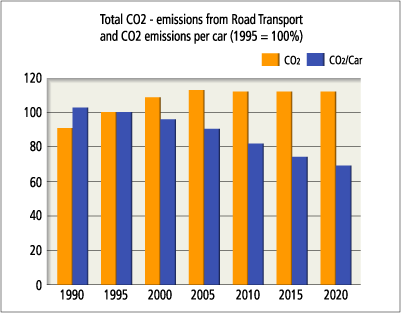|
|
|||||||
|
|
|||||||
I. Title of the Best PracticeCO2 Emissions from Cars
|
| * European car manufacturers in ACEA: BMW AG, DaimlerChrysler AG, Fiat S.p.A., Ford of Europe Inc., General Motors Europe AG, Dr. Ing. H.c.F. Porsche AG, PSA Peugeot Citroen, Renault SA, Volkswagen AG, AB Volvo
** Japanese car manufacturers in JAMA: Daihatsu, Fuji Heavy Industries (Subaru), Honda, Isuzu, Mazda, Nissan, Mitsubishi, Suzuki, Toyota *** Korean ca manufacturers in KAMA: Daewoo Motor Co. Ltd., Hyundai Motor Company, Kia Motors Corporation |
All three Agreements are either identical or equivalent having the following main features:
The CO2 emission objective: All Agreements contain the same quantified CO2 emission objective for the average of new passenger cars sold in the European Union, i.e. 140 gCO2/km (to be achieved by 2009 by JAMA and KAMA and by 2008 by ACEA).
Means of achievement: ACEA, JAMA and KAMA commit themselves to achieving the CO2 target 'mainly' by technological developments and related market changes which leaves scope for further market changes being induced by the other instruments of the Community's strategy.
The Agreements between the Commission and the automobile industries establish a fresh partnership based on mutual trust and show a new way to address environmental issues.
The three Agreements will make a significant contribution to the achievement of the Community's greenhouse gas emission objectives under the Kyoto Protocol. Passenger cars contribute to about 12 % of the European Union's total CO2 emissions. Overall, the predicted up-wards trend of CO2 emissions from passenger cars will be levelled-off.

Additional measures are necessary in order to reduce CO2 emissions from passenger cars further.
In this respect the Environment Council in October 1999 reiterated the need to inform consumers adequately, and invited the Commission to report on the state of work regarding its study of the possibility of establishing a reference framework for fiscal incentives.
The legislative work on consumer information can be considered as nearly completed. In the next step the Commission plans to put forward proposals on fiscal measures in order to achieve the EU's target of 120 g CO2/km by 2010 at the latest.
Moreover, in the context of international activities to combat climate change, the Environment Council stressed the advantages of equivalent commitments being made in other regions or countries.
| Detailed Description of Best Practices - European Union No.1 | ||||||
|
|
||||||
|
|
||||||
|
|
||||||